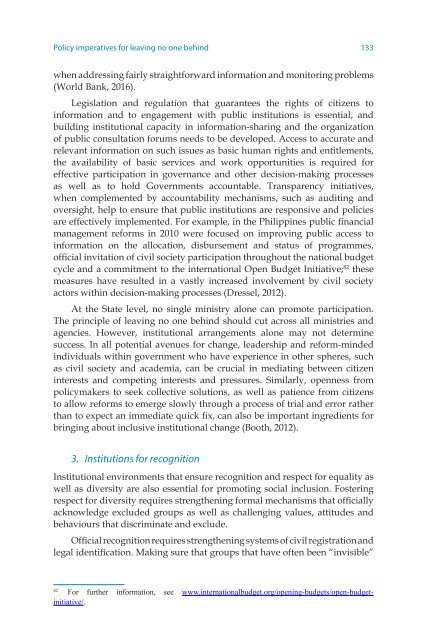Leaving no one behind the imperative of inclusive development
full-report
full-report
You also want an ePaper? Increase the reach of your titles
YUMPU automatically turns print PDFs into web optimized ePapers that Google loves.
Policy <strong>imperative</strong>s for leaving <strong>no</strong> <strong>one</strong> <strong>behind</strong> 133<br />
when addressing fairly straightforward information and monitoring problems<br />
(World Bank, 2016).<br />
Legislation and regulation that guarantees <strong>the</strong> rights <strong>of</strong> citizens to<br />
information and to engagement with public institutions is essential, and<br />
building institutional capacity in information-sharing and <strong>the</strong> organization<br />
<strong>of</strong> public consultation forums needs to be developed. Access to accurate and<br />
relevant information on such issues as basic human rights and entitlements,<br />
<strong>the</strong> availability <strong>of</strong> basic services and work opportunities is required for<br />
effective participation in governance and o<strong>the</strong>r decision-making processes<br />
as well as to hold Governments accountable. Transparency initiatives,<br />
when complemented by accountability mechanisms, such as auditing and<br />
oversight, help to ensure that public institutions are responsive and policies<br />
are effectively implemented. For example, in <strong>the</strong> Philippines public financial<br />
management reforms in 2010 were focused on improving public access to<br />
information on <strong>the</strong> allocation, disbursement and status <strong>of</strong> programmes,<br />
<strong>of</strong>ficial invitation <strong>of</strong> civil society participation throughout <strong>the</strong> national budget<br />
cycle and a commitment to <strong>the</strong> international Open Budget Initiative; 82 <strong>the</strong>se<br />
measures have resulted in a vastly increased involvement by civil society<br />
actors within decision-making processes (Dressel, 2012).<br />
At <strong>the</strong> State level, <strong>no</strong> single ministry al<strong>one</strong> can promote participation.<br />
The principle <strong>of</strong> leaving <strong>no</strong> <strong>one</strong> <strong>behind</strong> should cut across all ministries and<br />
agencies. However, institutional arrangements al<strong>one</strong> may <strong>no</strong>t determine<br />
success. In all potential avenues for change, leadership and reform-minded<br />
individuals within government who have experience in o<strong>the</strong>r spheres, such<br />
as civil society and academia, can be crucial in mediating between citizen<br />
interests and competing interests and pressures. Similarly, openness from<br />
policymakers to seek collective solutions, as well as patience from citizens<br />
to allow reforms to emerge slowly through a process <strong>of</strong> trial and error ra<strong>the</strong>r<br />
than to expect an immediate quick fix, can also be important ingredients for<br />
bringing about <strong>inclusive</strong> institutional change (Booth, 2012).<br />
3. Institutions for recognition<br />
Institutional environments that ensure recognition and respect for equality as<br />
well as diversity are also essential for promoting social inclusion. Fostering<br />
respect for diversity requires streng<strong>the</strong>ning formal mechanisms that <strong>of</strong>ficially<br />
ack<strong>no</strong>wledge excluded groups as well as challenging values, attitudes and<br />
behaviours that discriminate and exclude.<br />
Official recognition requires streng<strong>the</strong>ning systems <strong>of</strong> civil registration and<br />
legal identification. Making sure that groups that have <strong>of</strong>ten been “invisible”<br />
82<br />
For fur<strong>the</strong>r information, see www.internationalbudget.org/opening-budgets/open-budgetinitiative/.
















